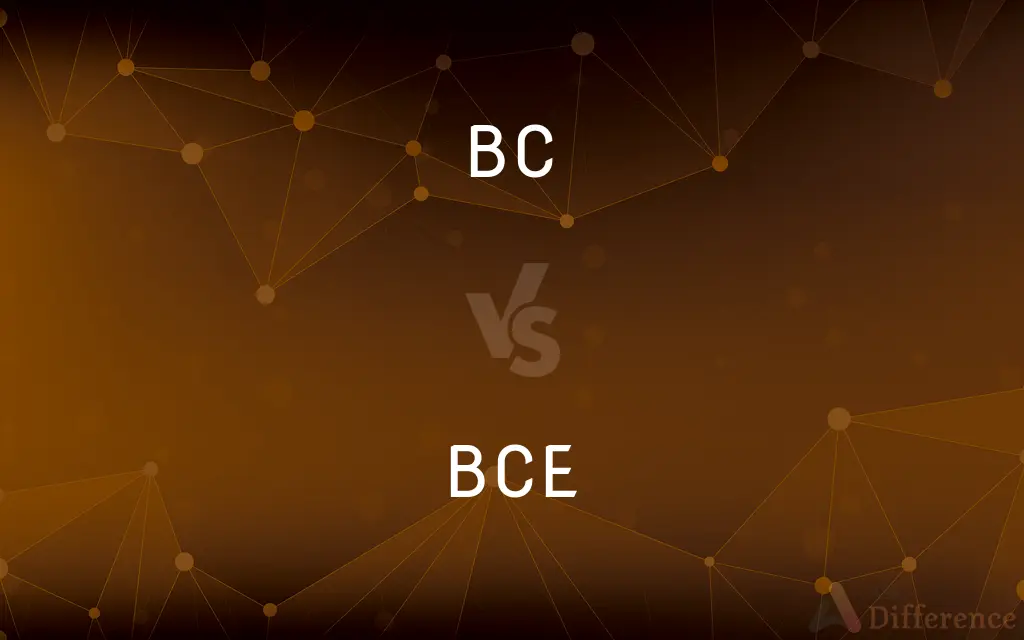BC vs. BCE — What's the Difference?
By Tayyaba Rehman — Published on January 29, 2024
BC (Before Christ) and BCE (Before Common Era) both denote years before the estimated birth of Jesus, but BCE is a secular alternative to BC.

Difference Between BC and BCE
Table of Contents
ADVERTISEMENT
Key Differences
BC, an abbreviation for "Before Christ," is traditionally used in the Gregorian calendar to represent years before the estimated birth year of Jesus Christ. BCE, standing for "Before Common Era," serves the same chronological purpose but is used as a secular, non-religious alternative to BC. Both terms demarcate the same historical time period, just with different nomenclature.
The use of BC is deeply rooted in Christian tradition, reflecting the calendar's origins in Christianized Western societies. BCE, on the other hand, was introduced to create a more inclusive, religiously neutral way of referring to the same time period. This neutrality makes BCE more common in academic, scientific, and intercultural contexts.
Both BC and BCE are used in conjunction with AD (Anno Domini, Latin for "Year of Our Lord") and CE (Common Era), respectively. AD and CE both denote years after the birth of Jesus Christ. The shift from BC to BCE and from AD to CE is part of a broader move towards secularization in historical and chronological references.
The numbering of years in both BC and BCE counts backward from the traditionally reckoned year of Jesus' birth. For example, 300 BC and 300 BCE both refer to the same year, 300 years before the year 1 AD/CE. The closer to the year 1, the smaller the number, whether in BC or BCE.
The choice between using BC or BCE often depends on the context and audience. In religious or traditional contexts, BC might still be preferred, while BCE is more common in academic, non-religious, and international settings. Despite the difference in terminology, there is no difference in the way years are calculated or understood between BC and BCE.
ADVERTISEMENT
Comparison Chart
Full Form
Before Christ
Before Common Era
Context
Religious, traditional
Secular, academic
Relationship to Christianity
Direct reference to Christ
Neutral, non-religious
Usage
Common in religious or historical texts
Preferred in academic and scientific communities
Chronological Meaning
Same as BCE, counting backward from the estimated birth of Jesus
Identical to BC in dating historical years
Compare with Definitions
BC
Common in religious and traditional historical texts.
In 44 BC, Julius Caesar was assassinated.
BCE
A secular alternative to BC.
Stonehenge was constructed between 3000 and 2000 BCE.
BC
Used in the Gregorian calendar for years before Jesus' birth.
Socrates was sentenced to death in 399 BC.
BCE
Used in academic and scientific contexts.
The first Olympic Games were held in 776 BCE.
BC
Stands for Before Christ.
The Roman Empire was founded in 753 BC.
BCE
Abbreviation for "Before Common Era."
The city of Babylon reached its peak around 1770 BCE.
BC
Reflects a Christian-oriented historical perspective.
The construction of the Great Pyramid was completed around 2560 BC.
BCE
Indicates the same time period as BC without religious connotation.
The Minoan civilization flourished in Crete around 2600 BCE.
BC
Counts years backward from the year 1 AD.
The Battle of Marathon took place in 490 BC.
BCE
Counts years backward from the year 1 CE.
The Terracotta Army was created in the 3rd century BCE.
BC
Before Christ; used in reckoning dates before the supposed year Christ was born, i.e. 1 a. d..
BC
Before the Christian era; used following dates before the supposed year Christ was born;
In 200 BC
Common Curiosities
Why do some historians prefer BCE?
Historians prefer BCE for its secular and inclusive nature.
Is the numbering the same in BC and BCE?
Yes, the years are numbered the same in both BC and BCE.
What does BC stand for?
BC stands for "Before Christ."
What follows BC or BCE in the calendar?
AD (Anno Domini) follows BC, and CE (Common Era) follows BCE.
What does BCE mean?
BCE means "Before Common Era."
Are BC and BCE interchangeable?
Yes, they refer to the same time periods but have different connotations.
Why was BCE introduced?
BCE was introduced to provide a secular, non-religious alternative to BC.
When did the use of BCE become common?
BCE became more common in the late 20th century, especially in academic and scientific contexts.
How do BC and BCE impact historical dating?
They provide a standardized way to date events before the common era.
What are the alternatives to using BC and BCE?
Some cultures use their own calendar systems, but BC/BCE and AD/CE are widely accepted for international communication.
Is BCE used globally?
BCE is widely used in academic, scientific, and international settings.
What year comes after 1 BC or 1 BCE?
1 AD or 1 CE follows 1 BC or 1 BCE.
Do all cultures use BC and BCE?
No, different cultures have their own calendars and systems for numbering years.
How are years counted in BC and BCE?
Years in BC and BCE are counted backward from the traditional date of Jesus' birth.
Can BC be used in academic writing?
While BC can be used, BCE is often preferred for its neutrality.
Share Your Discovery

Previous Comparison
1% Milk vs. 2% Milk
Next Comparison
Verbal Communication vs. Written CommunicationAuthor Spotlight
Written by
Tayyaba RehmanTayyaba Rehman is a distinguished writer, currently serving as a primary contributor to askdifference.com. As a researcher in semantics and etymology, Tayyaba's passion for the complexity of languages and their distinctions has found a perfect home on the platform. Tayyaba delves into the intricacies of language, distinguishing between commonly confused words and phrases, thereby providing clarity for readers worldwide.













































